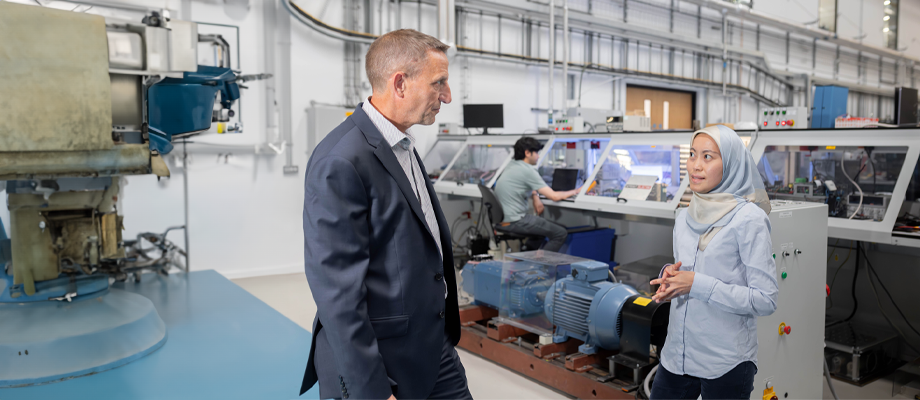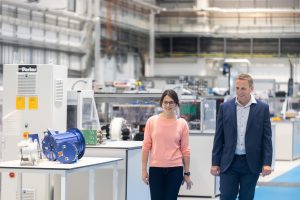
University research partnership results in groundbreaking new industry tech
November 28th, 2023
A partnership which paired researchers from the university with a UK tech company has produced a highly advanced power converter to drive an electric motor that could revolutionise the manufacturing and renewable energy industries.
For the past five years, researchers from the university have worked closely with digital motor control solutions company, Sprint Electric, to develop and prototype the Generis AC regen drive – set to be the next generation in AC drive technology.
Launched in November at the Smart Production Solutions (SPS) exhibition in Nuremberg, one of the most highly regarded international trade fairs in the field of smart and digital automation solutions; this leap in innovation has been made possible thanks to two Knowledge Transfer Partnerships (KTPs) between researchers at the University of Nottingham’s Power, Electronics and Machines Centre (PEMC), and Sprint Electric.
The aim of a KTP is to connect businesses that have an innovation idea with the academic expertise to develop new products or services, expand markets, and improve efficiency and productivity. In Sprint Electric’s case, it fully embraced the collaborative opportunity, establishing a base at the PEMC at Nottingham’s Jubilee Campus.
Dr Azlia Abdul Rahman, a PhD graduate recruited to lead the KTP – known as the KTP Associate – explained:
“I was based at these premises for the duration of the second KTP, which meant I was right there in the thick of it and involved at every stage of the research and development lifecycle. I worked closely with Associate Professor Liliana de Lillo as the main academic supervisor, while Professor Pat Wheeler, Head of the PEMC Research Group, oversaw the project.
Liliana was part of a wider team of researchers supporting me in transferring the theoretical knowledge the company needed to develop the technology.
Training Sprint Electric’s staff, documenting everything we did, and writing technical reports was just a fraction of my work – to all intents and purposes I ‘joined’ the company for two years to help make this happen.”
Sprint Electric have been manufacturing variable speed controllers since 1987, traditionally specialising in the control of DC motors. With the help of the university they’ve removed the need for a DC link in the AC drive, offering several advantages over conventional converters, such as higher efficiency, faster response, and two-way power flow. One of the main applications of matrix converters is in renewable energy systems, such as wind turbines, solar panels, and fuel cells.
Mark Gardiner, Director of Sprint Electric, said he was delighted at the outcome of the partnership work with the university. He said: “Our experience with KTPs has been a wholly positive one. Not only has it quickly and effectively embedded understanding of a complex technology in our business but it has also established a relationship with the PEMC group that I am confident will continue to deliver benefits to both parties in years to come.”
It would be easy to view KTPs like consultancy, where a company hires an expert to advise and guide them through a project or period of transformation. But KTPs are so much more, as Andrea McCluskey, Business Development Officer for KTP at the University of Nottingham explained:
“KTPs meld the theory from the academic side with specialist knowledge and expertise from within a business. What they have achieved will absolutely transform Sprint Electric as a company, and part of the electronic motor industry as a whole. Not only will it give them a significant competitive advantage, but it could also completely change the landscape for other businesses now and in the future.”
And what does the University of Nottingham gain from this achievement? Do the benefits of sharing its extensive knowledge and expertise go beyond merely boosting the profit margin of one individual company?
The answer is a resounding yes – apart from the potential seismic impact on industry, the intensive efforts of the PEMC will act as a case study for the Research Excellence Framework (REF), which evaluates and recognises the contribution made by university research. As well as international recognition and prestige, this could lead to increased research funding for the University in the future and pave the way for further technological improvements and societal change.
“It is a win-win situation for all parties,” said Andrea. “Knowledge Transfer Partnerships are an invaluable opportunity to establish long lasting professional relationships which have the potential to turn into very valuable strategic relationships between academia and industry. Transferring research into real world applications is the ultimate dream of academics who want to generate real global impact, and this is only possible by working with an industrial partner.
“You also get to see graduates develop, increasing their knowledge and expertise; the company obviously benefits through increased profits; and the Associates benefit through career development and exposure to industry, sowing the seeds for the next generation of business leaders. KTPs also aim to train future business leaders, in that businesses hope the Associates will stay in industry rather than academia.”
Sprint Electric unveiled its new AC regeneration drive at the at the Smart Production Solutions (SPS) exhibition in Nuremberg between 14 – 16 November.
Meanwhile the University of Nottingham, through its Knowledge Transfer Partnerships arrangement, will continue to support with the commercialisation of the product once it has launched.
Comments are closed.
Other

Need news? See you on SharePoint
After 14 years of service, Campus News is being retired as the university’s staff news platform. […]

Roads and car parks closed for refurbishing work
As part of ongoing road improvements at the university, works will be taking place to resurface […]


